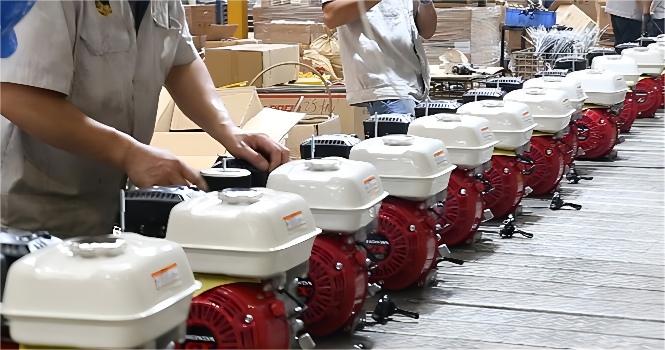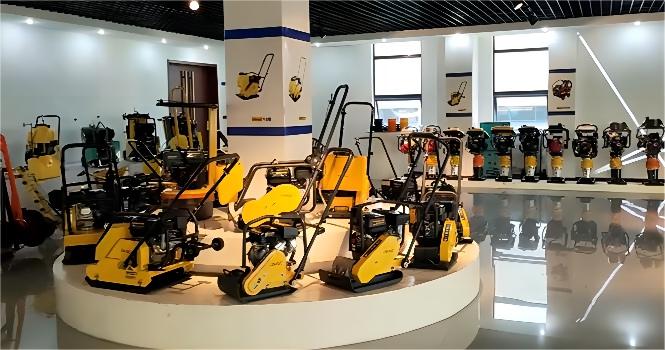Construction Road Roller PME-R3000
When you are looking for a construction road roller, we can assist you in selecting the most suitable compactor roller for your business.
Construction Road Roller PME-R3000
The PME-R3000 Construction Road Roller is a high-performance machine engineered for large-scale roadwork, soil compaction, and infrastructure development. With dual 710 mm diameter rollers and a 1200 mm width, this roller is designed for maximum efficiency and precision in heavy-duty compaction tasks. Its robust features and powerful performance make it the ideal choice for large construction projects requiring reliable and deep compaction.
Powerful Performance
Equipped with the reliable ChangChai ZN390B engine, the PME-R3000 delivers exceptional power and consistent performance, ensuring smooth operation on demanding construction sites. Its hydraulic double-wheels drive system guarantees smooth movement and reliable traction, while the hydraulic double-wheel vibration system provides a centrifugal force of 35 KN at a vibration frequency of 75 Hz. The nominal amplitude of 0.5 mm allows for effective and uniform compaction across various materials, including asphalt, gravel, and soil, ensuring stable and durable surfaces.
Versatile Application
The PME-R3000 is designed to tackle a wide range of compaction tasks. From road construction to large-scale foundation preparation and soil stabilization, this roller delivers precision and efficiency in every pass. The hydraulic steering system offers a wide turning radius of 3000 mm, allowing for excellent maneuverability in both open and confined spaces. Its gradeability of 30° ensures reliable performance even on steep slopes or uneven terrains. With a travel speed range of 0-12 km/h, the PME-R3000 covers large job sites quickly while maintaining control and precision.
Built to Last
The PME-R3000 is built for durability and longevity. Constructed with high-quality materials, it is designed to withstand the harsh demands of large construction projects. Its advanced hydraulic systems ensure smooth, uninterrupted operation, reducing maintenance requirements and maximizing uptime. Whether used for compacting subgrades, stabilizing soil, or preparing large foundations, the PME-R3000 is engineered to deliver reliable results and withstand the rigors of continuous use.
Applications
- Road Construction and Maintenance
- Asphalt, Gravel, and Soil Compaction
- Large-Scale Infrastructure Projects
- Foundation and Subgrade Preparation
- Soil Stabilization
- Compaction on Slopes and Uneven Terrain (Gradeability: 30°)
- Driveways, Pathways, and Landscaping
- High-Efficiency Compaction for Large Job Sites
With its powerful engine, advanced hydraulic systems, and superior compaction capabilities, the PME-R3000 Construction Road Roller is a top choice for contractors and professionals who require a reliable and efficient compaction solution for large-scale construction tasks. Its durable construction, precise performance, and user-friendly operation make it an invaluable asset for any heavy-duty construction project.
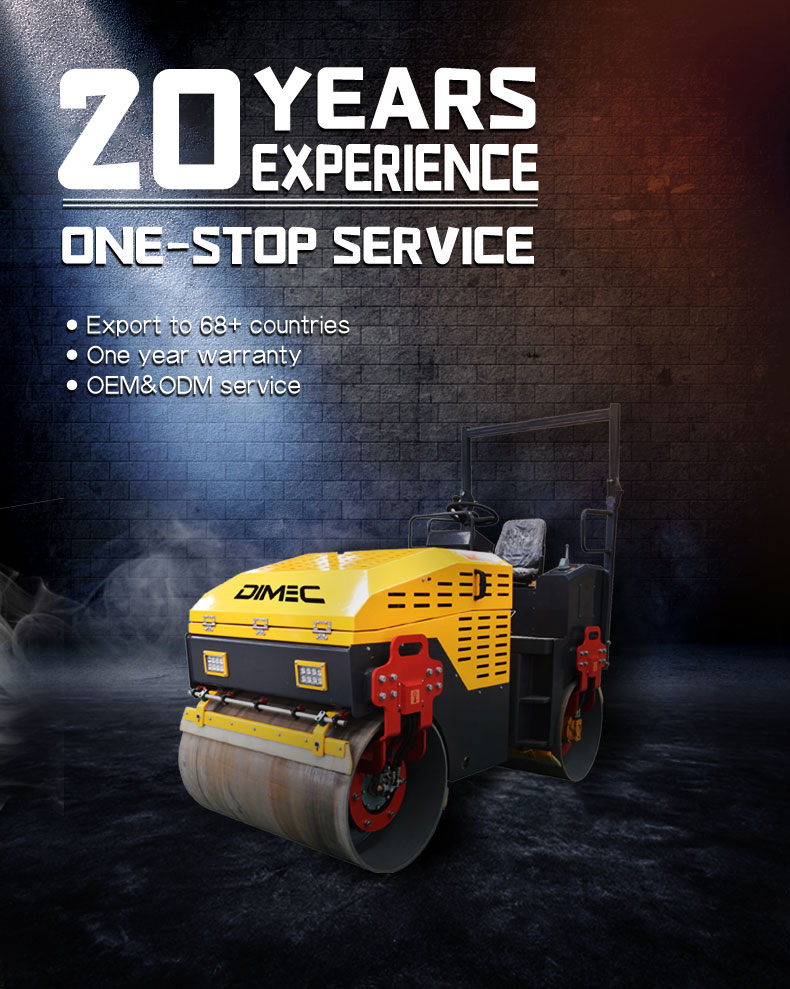


Key Specifications
| Model | Construction Road Roller PME-R3000 |
|---|---|
| Engine | ChangChai ZN390B |
| Roller size [diameter x width] | 2xφ710x1200 mm |
| Drive type | Hydraulic double wheels drive |
| Vibration type | Hydraulic douuble wheel vibration |
| Steering mode | Hydraulic control |
| Steering radius | 3000 mm |
| Nominal amplitude | 0.5 mm |
| Vibration frequency | 75 Hz |
| Centrifugal force | 35 KN |
| Gradeability | 30° |
| Travel speed | 0-12 km/h |
| N.W./G.W. | 3150/3200 kg |
| Package size | 280x130x215 cm |
ADVANTAGE

Exquisite Workmanship
The hood of the road roller showcases excellent craftsmanship. The bright yellow paint is flawlessly applied, providing a smooth and vibrant finish.
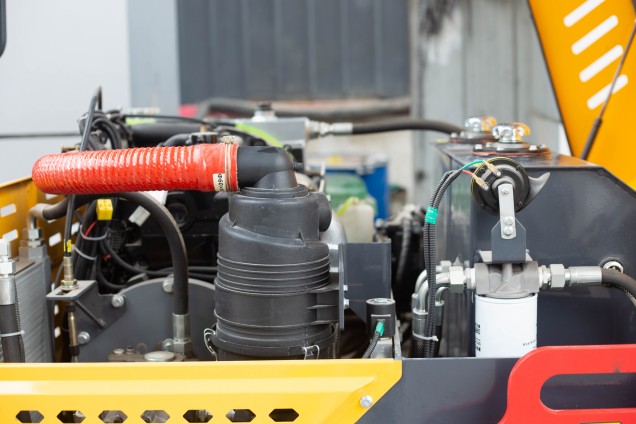
Efficient Engine Compartment Organization
The engine compartment is organized with components such as hoses, filters, and the engine block properly placed.This organized layout facilitates maintenance and ensures the smooth operation of the road roller's engine.
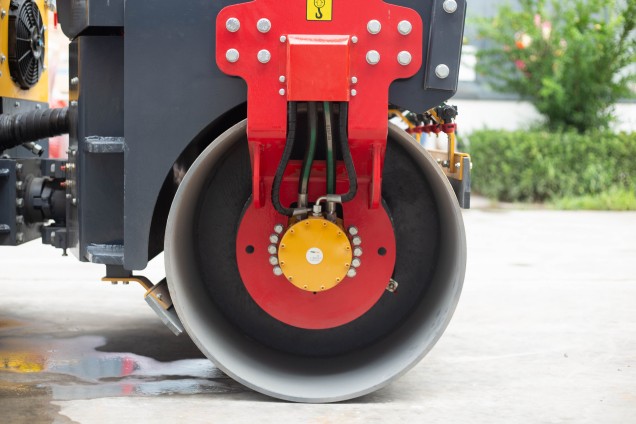
Large Compaction Drum
The roller features a large compaction drum at the front. This drum is responsible for compacting soil, asphalt, and other construction materials. The large size of the drum ensures a smooth and even compaction surface.
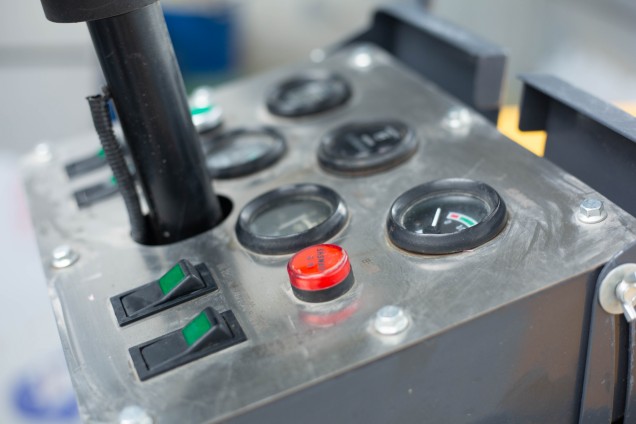
Intuitive Control Panel Layout
The control panel features a well - arranged layout with clearly marked buttons and gauges. This design allows for easy access and operation, reducing the likelihood of errors and improving the efficiency of the road roller's functions.
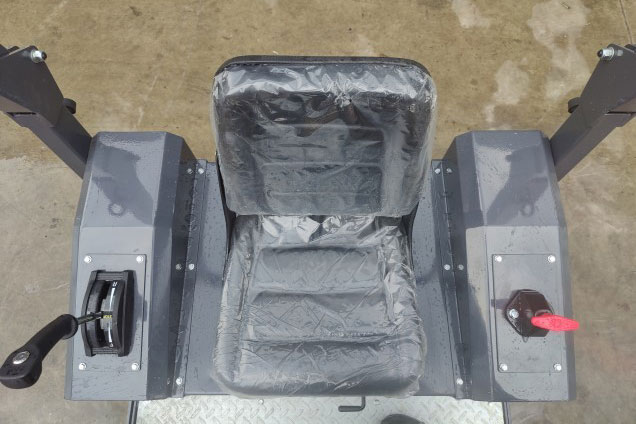
Comfortable Seat
The roller is equipped with a cushioned seat, providing comfort for the operator during extended use. It is flanked by handlebars, providing a secure and comfortable operating position for the operator, which enhances the overall usability of the road roller.
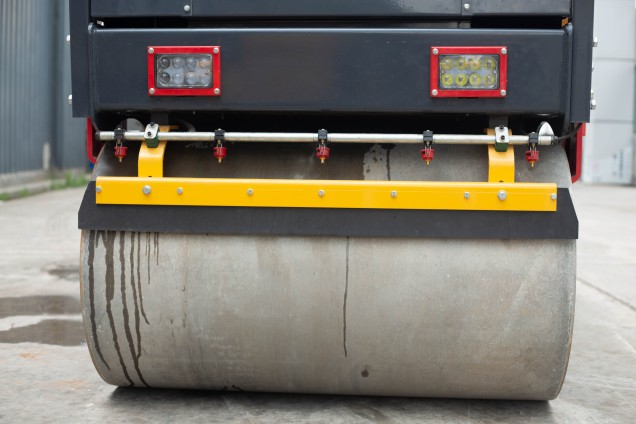
Drum with Scraper
The roller is equipped with a drum that has a built - in scraper. The scraper helps to remove any material that may stick to the drum during the compaction process, ensuring that the drum remains clean and effective. This feature is crucial for maintaining the quality of the compaction work.
QUESTIONS & ANSWERS
The primary function of a construction road roller is to compact materials such as soil, gravel, and asphalt during construction projects to create a smooth and stable surface.
The main types of road rollers include vibratory rollers, static rollers, and pneumatic rollers, each designed for different compaction needs.
Vibratory rollers use vibrations for compaction, while pneumatic rollers use rubber tires to apply pressure.
A vibratory road roller uses vibrations generated by the machine’s drums to compact materials more effectively, making it ideal for granular materials like sand or gravel.
Factors such as soil type, moisture content, roller weight, speed, and vibration frequency all play a role in determining the efficiency of the compaction process.
Regular maintenance includes checking the engine, hydraulic systems, and tires, as well as performing routine oil changes, filter replacements, and inspecting the vibratory mechanism.
Common issues include engine problems, overheating, and malfunctioning vibratory systems, all of which can often be resolved with proper maintenance and timely repairs.
Yes, pneumatic rollers are particularly suited for uneven terrains.
Renting is usually the better option for short-term or smaller projects.
Operators should wear helmets, high-visibility vests, and ear protection.
Other Similar Products
20+ Years of Experience
Construction Machine Manufacturer
Professional manufacturer of small construction machinery, main products include plate compactor, tamping rammer, road roller,floor saw, concrete vibrator, generator etc.
Construction Road Roller
Construction road rollers are an indispensable tool in modern infrastructure projects. From road construction to landscaping, these machines ensure that surfaces are compacted properly, offering a smooth and durable result. Whether you are choosing a road roller for your next project or maintaining one you already own, understanding the key features, types, and maintenance requirements is essential for maximizing their effectiveness.

Construction Road Roller: A Complete Guide to Types, Uses, and Benefits
Introduction to Construction Road Rollers
When you think of large-scale construction projects—whether it’s road building, infrastructure work, or even heavy landscaping—the construction road roller is likely to be a key player. But what exactly is a road roller, and why is it indispensable on the job site?
A construction road roller is a powerful machine used to compact soil, asphalt, and other materials to create a solid and stable surface. These machines are critical for ensuring the durability of roads and other surfaces that must withstand heavy traffic and weather conditions. Whether it’s flattening the ground for a new road or compacting layers of asphalt, road rollers ensure that the foundation is strong and level.
Why Road Rollers are Essential for Construction Projects
Road rollers help in increasing the density of the material being compacted, which improves its stability and load-bearing capacity. Without them, construction projects would be far more time-consuming, and the quality of the roads or pavements could suffer. Road rollers also reduce the risk of cracks and other structural failures by ensuring even compaction.
Types of Construction Road Rollers
There are several types of construction road rollers, each designed for specific tasks. Let’s explore these different types to understand their functionalities.
Vibratory Rollers
Vibratory rollers are equipped with a system that produces vibrations during compaction. These vibrations help in breaking up air pockets within the material, achieving higher compaction density. These are commonly used for compacting asphalt and soil in large construction projects.
Static Rollers
Static rollers do not have a vibration system. Instead, they rely on the weight of the drum to compact the surface. They are typically used for less demanding compaction tasks, such as compacting subgrades or softer materials.
Tandem Rollers
Tandem rollers are equipped with two drums, one in the front and one in the rear. These are used primarily for asphalt compaction and are particularly effective for creating smooth, even surfaces. The dual drum design allows for even distribution of force.
Pneumatic Rollers
Pneumatic rollers use a series of rubber tires instead of a solid drum. These tires help distribute the compaction force more evenly across the surface. They are ideal for use on granular soils and for final compaction of asphalt surfaces.
Combination Rollers
Combination rollers combine the best features of both vibratory and pneumatic rollers. They feature a vibratory drum in the front and a set of pneumatic tires in the back, making them versatile for use on both granular and asphalt surfaces.
Key Components of a Construction Road Roller
Understanding the key components of a road roller can give you a better idea of how it functions. Here are the main parts:
Drum
The drum is the most critical part of the road roller. It’s the large cylindrical surface that comes into direct contact with the material being compacted. Drums can be either smooth or patterned, depending on the type of compaction needed.
Engine and Power System
The engine provides the necessary power for the roller’s movement and operation of the drum. Road rollers usually have diesel engines for maximum power output, although electric models are becoming more popular in eco-conscious markets.
Operator’s Cabin
The operator’s cabin is where the driver controls the machine. Modern rollers have ergonomic cabins with advanced controls and even air-conditioning for comfort during long working hours.
Tires and Traction System
Tires are used on pneumatic and combination rollers. The traction system helps move the roller forward and backward, providing the necessary force for compaction.
Control System
The control system includes the steering, compaction control, and hydraulic systems. Many newer models include digital displays and automated settings for optimal compaction.
How Road Rollers Work
The key to understanding road rollers lies in their compaction process. Here’s how they work:
Compaction Process
Road rollers use weight, vibration, and pressure to compress layers of soil, asphalt, or other materials. The drum rolls over the surface repeatedly to ensure even compaction.
The Role of Vibration and Pressure
In vibratory rollers, the vibrations help the material settle more evenly, while static rollers rely on the pressure from the drum’s weight. Both methods ensure a tight, stable surface that can handle heavy loads.
Achieving Optimal Compaction
To achieve optimal compaction, it’s important to adjust the roller’s speed, vibration settings, and pressure based on the material being compacted and the surface’s condition. A well-compacted surface leads to better durability and less maintenance in the future.
Factors Affecting Compaction
Several factors influence the effectiveness of compaction when using a construction road roller:
Soil Type: Different soil types require different compaction techniques. Granular soils like sand or gravel are easier to compact than cohesive soils like clay.
Moisture Content: The moisture level of the material plays a crucial role. Too much moisture can cause the material to be too soft, while too little moisture may make it too hard to compact effectively.
Roller Weight and Speed: The weight of the roller determines the amount of pressure applied during compaction. The speed at which the roller moves also affects the quality of compaction—too fast and the material won’t compress properly.
Role of Frequency and Amplitude
In vibratory rollers, the frequency and amplitude of the vibrations are essential for achieving effective compaction. Higher frequency and amplitude can help achieve deeper compaction, especially for granular materials. Operators adjust these settings based on the material being compacted and the depth of the layer.
Uses of Construction Road Rollers
Road rollers are used in a variety of applications, all vital for construction and infrastructure projects.
Road Construction and Repair
One of the most common uses of road rollers is in road construction. From preparing subgrade material to compacting asphalt layers, road rollers play an essential role in ensuring roads are durable and capable of supporting traffic.
Soil Compaction
In large-scale earthworks, road rollers are used to compact soil for foundations, embankments, and dams. This process ensures the soil has the required density to support structures without shifting or settling.
Asphalt Paving
When laying down asphalt, rollers help achieve a smooth, uniform surface. They help bond the asphalt layers together and prevent cracking due to uneven compaction.
Landscaping and Ground Preparation
In landscaping, road rollers are often used to prepare ground surfaces for features like playgrounds, sports fields, and parking lots, ensuring the ground is level and stable.
Benefits of Using Construction Road Rollers
There are several advantages to using road rollers in construction projects:
Efficiency in Compaction
Road rollers drastically speed up the compaction process. Their weight and technology allow for quick and consistent results compared to manual methods.
Time-Saving Features
Road rollers can cover large areas quickly, reducing the amount of time required for project completion. The faster you complete compaction, the sooner you can move on to the next phase of construction.
Cost-Effectiveness for Large Projects
Though road rollers are expensive, their efficiency makes them cost-effective in the long run. For large-scale projects, they save both time and labor costs.
Durability and Longevity
Modern road rollers are built to last, providing years of reliable service when properly maintained.
Factors to Consider When Choosing a Road Roller
Selecting the right road roller can be a complex decision, influenced by several factors:
Terrain and Surface Type
Different rollers are better suited for different types of terrain. For example, pneumatic rollers are great for granular soils, while vibratory rollers excel in asphalt work.
Load and Compaction Requirements
The load and compaction requirements of your project will determine whether you need a static or vibratory roller, or something in between.
Budget and Operational Costs
Consider the initial purchase cost as well as the operational costs, including fuel, maintenance, and repairs.
Fuel Efficiency
Fuel consumption can vary significantly among models. If you’re working on a large project, it’s worth considering fuel efficiency to reduce overall costs.
Common Challenges with Road Rollers
While road rollers are incredibly useful, they come with their own set of challenges:
Maintenance and Repair Issues
Like all heavy machinery, road rollers require regular maintenance to function properly. Failure to maintain the machine can lead to costly repairs.
Operator Training and Safety Concerns
Operating a road roller requires skilled training to ensure safety. Without proper training, operators can make costly mistakes that impact the project’s quality.
Environmental Impact and Fuel Consumption
Older models of road rollers may not be as fuel-efficient, contributing to higher emissions. Newer models are addressing these concerns by adopting hybrid and eco-friendly technologies.
Safety Tips for Operating a Road Roller
Safety is paramount when operating heavy machinery. Here are some key tips:
Proper Training and Certification
Always ensure that the operator is properly trained and certified to operate road rollers.
Routine Inspections
Before each use, perform a safety check to ensure all components are in working order.
Protective Gear and Precautions
Wear necessary safety gear, including helmets, high-visibility vests, and ear protection.
Technological Advancements in Road Rollers
New technologies are continuously shaping the future of road rollers. Here’s what’s on the horizon:
GPS and Intelligent Compaction Systems
Some modern rollers now include GPS systems and intelligent compaction technologies that help improve accuracy and efficiency during operation.
Eco-friendly and Hybrid Models
As part of the push toward sustainability, some manufacturers are introducing eco-friendly road rollers that use less fuel and emit fewer pollutants.
Automated and Remote-Controlled Rollers
Automation is becoming more prevalent, with remote-controlled rollers and autonomous machines that can operate without a driver.
Maintenance Tips for Road Rollers
To maximize the lifespan of your road roller, regular maintenance is key:
Regular Engine Checks
Ensure the engine is well-maintained with regular oil changes and air filter checks.
Drum Maintenance
Inspect the drum regularly for wear and tear, especially if you’re working with harsh materials.
Tire and Traction System Care
Check the tires and traction system frequently to ensure they remain in good condition.
Hydraulic System Maintenance
Hydraulic systems should be inspected for leaks, and fluid levels should be topped up regularly.
Cost of Construction Road Rollers
The cost of road rollers can vary depending on the model, size, and features. New machines can range from tens of thousands to hundreds of thousands of dollars.
Price Ranges for Different Models
Small, compact road rollers might cost less, while large, feature-rich models can reach the higher end of the price spectrum.
Renting vs. Buying a Road Roller
For smaller projects, renting might be more cost-effective, while larger, ongoing projects may benefit from purchasing.
Road Roller Manufacturers and Popular Brands
Some leading brands in the industry include Caterpillar, Volvo, and Bomag, which are known for their reliability and advanced technology.
Conclusion
Construction road rollers are essential tools that ensure the durability and stability of roads and other construction surfaces. By understanding their types, uses, and benefits, you can make informed decisions about which roller is right for your project. From improving efficiency to reducing costs, road rollers play a significant role in modern construction.
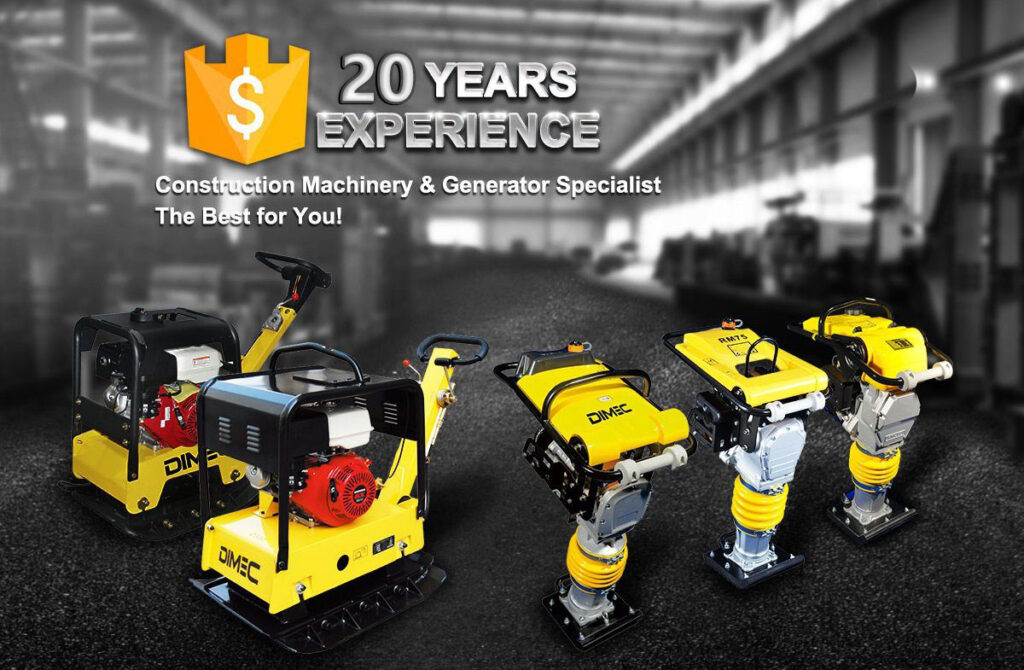
About Us
Wuxi Pinnacle Mechanical Equipment Co., Ltd. (PME) As a first-class specialty enterprise we serve global clients. PME specialize on production of plate compactor, tamping rammer, floor saw, concrete vibrator for global construction industry. We also produce engine, generator, and water pump. PME’s strengths are rooted from our strong team and rich resources.
We have complete production and assembly lines for different machines. There is a team of chief engineers, senior technicians and QC inspectors, equipped with a variety of finishing, spare parts inspection and product testing equipment, to safeguard production and innovation. Thus, we can control every step of production, from finish machining of spare parts, steel plate cutting and welding, spraying paint, all the way to product assembly. This results in effective product quality control.
With more than 20 years of exporting experience, PME has been exporting to over 68 countries and regions including North America, South America, Europe, Southeast Asia, Middle East, Africa. We also form strategic corporations with many multinational companies.
Factory Show
Let our expertise in custom Forward Plate Compactor take your projects to the next level.
Why Choose Us
Professional construction machinery manufacturer with OEM service
We are a leading manufacturer in the construction machinery industry, offering top-notch Original Equipment Manufacturer (OEM) services. Our commitment to innovation and precision engineering ensures that our machinery meets the specific needs of our clients, providing customized solutions that enhance efficiency and performance on the job site.
20 years production and exportation experience
With two decades of experience in production and exportation, we have built a strong reputation for delivering reliable and high-quality construction equipment worldwide. Our extensive knowledge and expertise in the industry enable us to understand the unique challenges of different markets, ensuring our products are tailored to meet global standards.
20+ types of construction site equipment are available for selection
We offer a diverse range of over 20 types of construction site equipment, catering to various industry needs. From heavy-duty machinery to specialized tools, our product lineup is designed to support every phase of construction, providing our clients with the flexibility to choose the right equipment for their projects.
10+ years QC monitor products quality
Our rigorous quality control processes have been refined over more than 10 years, ensuring that every piece of equipment we produce meets the highest standards. Our dedicated QC team meticulously monitors every stage of production, guaranteeing that our products deliver consistent performance and durability in the field.
8+ years experienced skilled workers
Our team comprises highly skilled workers with over 8 years of experience in the construction machinery industry. Their expertise and dedication are reflected in the precision and craftsmanship of our products, ensuring that every detail is executed to perfection.
8 workshops, 12 production lines
With 8 state-of-the-art workshops and 12 production lines, our manufacturing capabilities are designed to meet large-scale demands efficiently. Our advanced facilities allow us to maintain a streamlined production process, ensuring timely delivery of high-quality machinery to our clients around the world.
Unlock Superior Construction Efficiency with Our Expertly Engineered Machinery
Discover a world of advanced construction equipment tailored to meet the demands of modern job sites. With 20 years of industry experience and a commitment to quality, our machinery is designed to boost productivity and ensure reliability in every project. Explore our diverse range and experience the difference of precision-engineered solutions.




